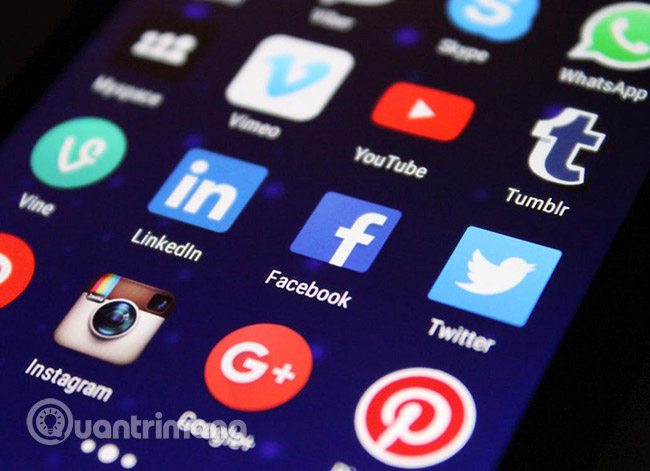What is addiction to social networks and how to solve this problem?
How long can you not check your Facebook or Twitter page? According to experts, 28% of iPhone users check their social networks before getting out of bed and 18% can't do anything more than three hours, without checking what's happening on social media. There are more than 2 billion social network users and the two most popular social networks today are Facebook and Twitter.
Over the years, there has been a lot of debate about using excessive social networks as a type of Internet addiction disorder (IAD), a symptom of another disorder, or just a habit. bad. Any addiction manifests itself by the inability to control impulses, so overuse of anything, such as a social network, is also considered an impulse control disorder. When there are many health professionals in the United States who think that excessive use of social networks is a symptom of another disease, not a real disorder, other countries, such as Korea and China Quoc, again launched its own IAD classification system.

Social addiction is a phrase sometimes used to refer someone to spend too much time using Facebook, Twitter and other social networking forms, so that these social networks intervene too deeply. into other aspects of everyday life.
Without official medical recognition of social addiction, it is a disease or a disorder. However, a series of behaviors related to the use of too many social networks has become the subject of many discussions and studies.
What is addiction to social networks and how to solve this problem?
- Definition of addiction to social networks
- Marriage and social network
- Internet addiction disorder
- Bad habits or addiction?
- The facts about science
- overview
- Three types of Internet addiction
- Signs of addiction to social networks
- What is being done to handle addiction to social networks?
- What can you do?
Definition of addiction to social networks
Addiction often refers to coercive behavior that leads to negative effects. When addicted, addicts feel compelled to do certain activities, so that they become harmful habits, then interfere with other important activities, at work or school. learn.
In this context, a person addicted to social networks can be considered a person who tends to use social networks beyond the normal level. For example, constantly check Facebook status updates or "track" profiles of people on Facebook for hours.
But it's hard to know when an activity becomes a dependency, and crosses the line between a harmful and addictive habit. So spend three hours a day on Twitter, to read random tweets from strangers, does that mean you're addicted to Twitter? What if you spend five hours? You may think that you only read the main or essential news in your work related field, right?
Researchers at the University of Chicago conclude that addiction to social networks may be even more intense than cigarette and alcohol addiction, after an experiment in which they recorded the feelings of addiction to hundreds of people in several week. Social addiction is ranked before craving for cigarettes and alcohol.
And at Harvard, researchers use functional MRI machines to scan the brains of experimental people, and see what happens when they talk about themselves, which is an important part of what people usually do. do on social networks. They found that the self-disclosure of information stimulated the entertainment centers of the brain, like sex and food.
Many doctors have observed symptoms of anxiety, depression and some psychological disorders in people who spend too much time online, but there is little evidence to prove that social networking or use The Internet causes these symptoms, and so is the addiction to social networks.
Marriage and social network
Meanwhile, sociologists and psychologists have discovered the impact of social networking on real-world relationships, especially marriages, and some have questioned whether use how many social networks can affect divorce.
The Wall Street Journal reported that 1 in 5 marriages were destroyed by Facebook, but note that there does not seem to be any direct scientific evidence to prove it.
Sherry Turkle, a researcher at the Massachusetts Institute of Technology, has written extensively about the impact of social networks on relationships, and in theory, social networks really undermine the relationship between people. In her book, Alone Together: Why We Do More from Technology and Less from Each Other , she compiled some of the negative effects of continually connecting with technology, and making people feel more lonely.
However, other researchers conclude that social networking can make people feel better and connect more with society.
Internet addiction disorder
Some argue that the use of too many social networks is simply the latest form of "Internet addiction disorder", a phenomenon that has attracted attention since the 1990s, when Internet use began to spread. wide. Even then, people think that excessive use of the Internet can reduce performance at work, in schools and in family relationships.
Nearly 20 years later, there is no consensus that overuse of the Internet or social networks is a pathology or should be considered a medical disorder. Some people have asked the American Psychological Association to add Internet addiction to official medical documents about disorders, but APA has denied this.
However, if you wonder if you are spending too much time online, try checking Internet addiction for accurate results.
Bad habits or addiction?
It is difficult to determine whether excessive use of social networks is just a bad habit or a disorder, such as depression and bipolar disorder. According to a study, official guidelines are based on clinical diagnosis and scientific criteria, do not identify addiction as a specific type of initial disorder. Some symptoms are considered to be part of the addiction disorder, included in many guidelines, and a symptom of another disease, such as a personality disorder.
In another article, the author states that there is not enough solid information to conclude that social addiction is a kind of mental disorder or a type of disease, because there is no universal criteria for addiction symptoms. Social Network. However, the fact that addiction to social networking is a process of excessive and harmful use of the Internet. Social network users at this level have been reported to cause negative impacts on their lives and work.

A study was done that included tests "Beck's Anxiety Inventory (BAI), Beck's Depression Inventory (BDI), Young's Internet Addiction Test (IAT) and BIS-11, South Oaks Gambling Screen (SOGS)", showing reduction of emotional control in people addicted to social networks. In fact, dopamine D2 receptors are significantly reduced in people addicted to social networks. The importance of this finding is to show evidence of social addiction that affects nerves.
The facts about science
Similarly, many magnetic resonance imaging (fMRI) studies have reported activity in different brain regions of excessive gamers, compared to moderately active players, in responding to internal signals. game With the same token and activated areas on the same brain, the results show that the level of stimulation increases in patients with substance abuse, because there are some cues that cause cravings. living in them. One more evidence for this is that, when patients take certain drugs for addictive disorders, such as bupropion, the level of stimulation in the brain decreases, and the patient's craving for social networking also decreases.
According to another study, excessive use of social networks is a serious problem for 6% to 11% of Internet users in the United States. If the medical community continues to believe that social addiction is not a real medical disorder, people with this disorder will not be able to get the necessary treatment, to control their emotions and live a normal life. In order to receive full recognition in the mental sector, addiction to social networking needs to be considered a true mental condition, rather than a mere symptom.
overview
The arguments about addiction to social networks are a psychological disorder that is not really inaccurate, nor is it far-fetched to believe that many individuals around the world are suffering from this disease. Many studies are done by experts in psychology, to convince people that addiction to social networking is really a serious psychological disease, needing treatment. If left untreated, people who are addicted to social networks will continue to create conflicts with other activities, such as learning, work and society. Health experts have shown that addiction to social networking possesses all the criteria that describe common addiction symptoms. Some of these criteria include:
- Use social networks more than usual
- Always concerned about social networks
- Feeling uneasy when not using social networks
- Try to stop or reduce your social network usage many times without success
- Want to use social networks
- Loss of interest in other activities
- Continue to use social networks despite negative consequences
- Use social networks to reduce bad moods
Lies about the amount of time they use their social networks
As stated in an article by Hinics, some difficulties in identifying addicted social networks are completely confusing. There are some interesting suggestions, in the debate about whether addiction to social networking becomes a real pathology, it is:
- Provide clear diagnostic criteria
- Identify a list of specific symptoms
- List subcategories
- Find the most accurate tools to diagnose addiction to social networks
Three types of Internet addiction
Another medical expert explained that Internet addiction has three types: gaming, preoccupation with sex and excessive messaging. In addition, he stated that all of these Internet addictions stem from excessive or problematic use of social networks, based on a number of criteria. These criteria include: Gradually increasing the amount of time spent on social networking, the appearance of addiction symptoms and ignoring or denying negative consequences. Similarly, these are also some symptoms of drug abuse disorder.

One study found that addiction to social networks is actually the root of poorer mental health work, through one of four-year studies that study adolescent subjects (level 2 and level). 3). In this study, researchers found many evidence that adolescents, initially without mental health disorders, were 2.5 times more likely to be positive for depression, after 9 month of study participation. Another part of the same study concluded that both men and women are likely to be addicted to the Internet, but their choice of Internet behavior varies. The male friends in this study chose regular adult gaming and web sites, while girls prefer to choose email and social networking sites, such as Facebook and Twitter (Ciarrochi et al., 2015). .
Signs of addiction to social networks
Even when addicted to social networking is not officially diagnosed, there are some signs of addiction that can help you determine if someone has a problem. Some signs that a person addicted to social networking includes:
- Spend more time on social networking sites
- Think about social networking sites even when not online
- Feeling a great need to share something on Facebook or other social networking sites
- Worry or stress if you can't stay online for a certain period of time
- Trying to cut down on social network usage
- Using social networks is causing negative impacts on life, relationships in schools or agencies
Disputes over the use of excessive social networks or problems are actually a disorder or just a side effect of another disorder, such as clinical depression, attention deficit hyperactivity disorder (ADHD), or bipolar disorder, there seems to be no endpoint. In fact, both sides have a compelling argument, with a lot of research and clear evidence of each aspect. So who is the most affected? These are people who are affected by excessive or problematic Internet use and cannot find a way to solve the problem, without the consent of experts.
Moreover, not only mental health is affected by excessive social network use. There have been studies showing that some college students experience physical health problems, such as obesity and sleep disorders. In fact, psychological depression, attention deficit hyperactivity disorder (ADHD) and behavioral disorders, such as drug and alcohol abuse, as well as self-injury can be a consequence of using social networks. Assembly too much. That is also what many experts are considering about social networking addiction.

What is being done to handle addiction to social networks?
In short, more information is needed to determine whether addiction to social networking is a real pathology, because the criteria for recognizing this disorder are not widely accepted. In Asian countries like Korea and China, the diagnosis of addiction to social networks has been accepted as a real pathology, and people with disorders are seeking ways to reduce their addiction symptoms with drugs and therapies. While health professionals decide whether addiction to social networking is a real disorder, psychological experts still need consensus to distinguish the types of patients, levels or progression of disorders, and most importantly, treatment of disorders.
What can you do?
If you believe you may be addicted to social networking, there are people you can share about. In fact, you don't even have to leave the house, because you can talk online with experts, to determine if you really have a problem and need treatment.BetterHelp.com is the largest provider of mental health services in the world and has more than 2,000 licensed counselors, therapists and psychologists. Their service is available 24 hours a day, seven days a week so you can contact them in the most convenient way.
See more:
- 6 negative impacts of social networks on users
- "Detox" Facebook in a scientific way
- What signs of addiction to games? Are you a game addict?